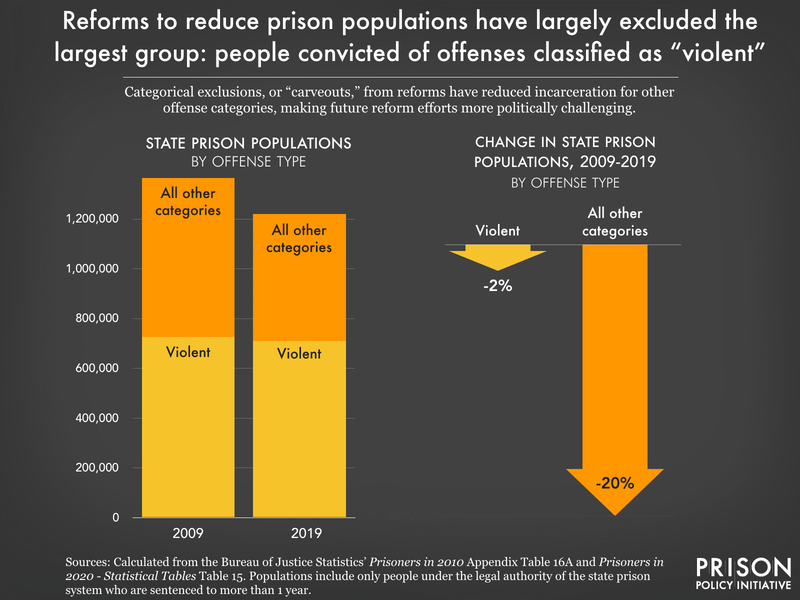New resource: Contending with carveouts: how and why to resist charge-based exclusions in reforms
Carveouts dramatically lessen the impact of criminal legal system reforms. In a new tool for advocates, we offer ways to resist carveouts when new reforms are proposed.
by Wanda Bertram, June 26, 2023
Today, the Prison Policy Initiative released its latest resource for advocates fighting for impactful reforms that shrink the footprint of the criminal legal system: a guide to avoiding harmful “carveouts” that appear in many reform bills. Carveouts are clauses that serve to exclude large categories of people — often the majority of those who stand to benefit — from reform, by reserving policy changes for people convicted of “nonviolent, non-sexual, and non-serious” offenses.
As our new guide explains, almost all major criminal legal system reforms in the last 20 years have excluded people charged with or convicted of violent or sex-related offenses. Many of these carveouts have been particularly unnecessary because they applied to programs already controlled by prosecutors, ironically limiting prosecutors’ discretion around things like diversion programs. The result has been to limit the impact of reform and further entrench mass incarceration.

Our guide walks through common arguments in favor of excluding all but the “non, non, nons” from reform, offering counterarguments for advocates to respond with. Arguments (and responses) we discuss include:
- “We have to start with reforms to nonviolent charges, and we’ll ‘come back’ for more serious charges later.” In fact, as we explain, decades of legislation with carveouts has not led to a wave of legislation “coming back” to address the majority of people in prison. Rather, carveouts make later reform harder by reinforcing the flawed logic of mass incarceration.
- “Victims of violent crime want people with violent charges excluded from reform.” Data show that the reverse is true: Victims of violent crime are more interested in alternatives to incarceration than in keeping people locked up.
- “Including people charged with violent offenses in reform will harm public safety.” In reality, re-arrest rates are lowest among people convicted of violent offenses, and research shows that only a tiny fraction of people convicted of serious violent offenses who are released from prison later come back to prison for another violent offense.
- “People convicted of violent offenses don’t deserve mercy or reform.” This argument assumes that everyone convicted of a serious offense is the same, painting with an extremely broad brush. Even when the crime someone was convicted for was undeniably violent or serious, categorically excluding people from reforms ignores the immense change people can undergo following the worst thing they have ever done.
Recognizing that what counts as a “serious” offense is always changing, our guide includes a section on fentanyl carveouts, which in recent years have excluded people using or selling fentanyl from drug law reforms. For advocates in states where legislatures are considering these carveouts, we lay out a few reasons why they are an ineffective and unjust policy.
This is the newest addition to our Advocacy Toolkit, which shares resources, tips, and best practices we’ve picked up through our work to end mass incarceration. The Toolkit’s other resources include a guide to filing public records requests, a guide to sources of data about the criminal legal system, and resources for fighting jail expansion.
Our new guide is here: https://www.prisonpolicy.org/trainings/carveouts.html
Have questions? Contact our Policy and Advocacy Manager, Sarah Staudt, at sstaudt@prisonpolicy.org.




Thank you for posting this information. So many of us are uninformed but want to help end mass incarceration in some way.